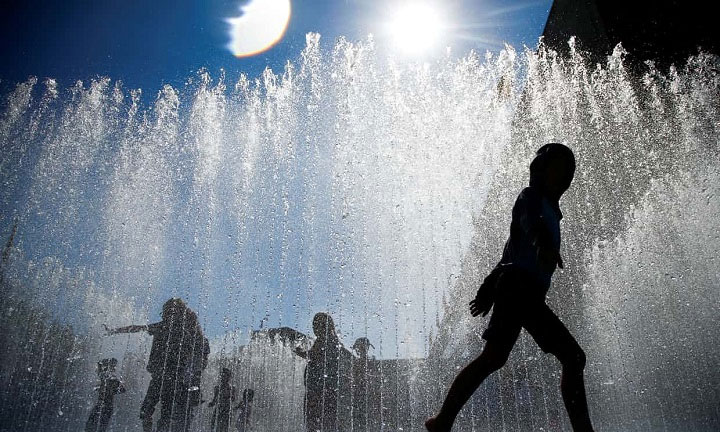Summer is 'stuck' because the Arctic is getting warmer
The rising Arctic temperature also means that we are facing the "extreme extreme" future, when the usual sunny and sunny day becomes fierce heat waves, and the rain becomes floods.
Summer in areas such as Europe, North America and most of Asia will be increasingly prolonged, as according to recent climate research, the warming of the Arctic will make the heat waves hot. Show more often, more dangerous.
Warming in the North Pole slows the circulation of Earth's giant winds. This means that low and high pressure blocks are stuck, and the weather will be harder to regulate.
The author of the study warns that this will cause extreme weather events to become . more extreme than ever, when the hot weather continues to persist, turning the Earth into a "pan. fire " followed by forest fires and floods.

This summer we witness many unusual heat waves.
Dim Coumou, from Potsdam Climate Impact Research Institute and co-author of the study, said: "We have witnessed many unusual heat waves this summer. And the concern is that will continue, especially in middle-latitude countries, including: Europe, the United States and China, and agricultural production will certainly be affected. The harvest of many products has plummeted, in addition, the hot sun will also devastate human health. "
For a long time, slowing down the circulation of wind flows has been a worry that meteorologists have to "scratch their heads". And after analyzing the weather trend of the summer, the team also showed evidence that the planet's wind system, including low-level storms and waves on the troposphere, is gradually lost the ability to change the weather.
One of the reasons for this phenomenon is the reduction in the temperature difference between the Arctic and Equator caused by the greenhouse effect . The study shows that the northern regions of the Earth are warming two to four times the global average, meaning that the temperature difference between this region and the center of the Earth will also be reduced. And when the difference gradually fades away, the winds will have difficulty storing energy to push the air pressure systems between them.
As a result, the land does not receive moist air from the sea to cool down, but the storms are so strong thanks to the source of moisture from the sea. Take Harvey as an example, before landing and devastating Texas, it stopped unusually long on the coast, where it was constantly sucking and accumulating moisture from the sea. The slowing down of the storms and the carrying of more rain have been predicted by scientists.
Another article on Scientific Reports also points out that the stuck of the planetary wind system is also a contributing factor to the forest fire in 2016 in the province of Alberta, Western Canada. It took them two months to fully heal this fire, the consequence of which has also broken every record with losses of up to 4.7 billion Canadian dollars.
The main author of the study, Vladimir Petoukhov, said: "It is clear that the behavioral wave model is not the only cause of fire, but it is a key factor in such a disaster. And In fact, since the 1980s, planetary winds have contributed to increasing the risk of forest fires in this area. "
Expressing agreement with the results of the study, University of London climate science professor Chris Rapley said: "What is happening in the Arctic leaves not only consequences in the North? We are disrupting the difference in temperature inherent between the polar and the equator through the imbalance of the Earth's energy balance, which has greatly contributed to the change in atmospheric flow. and the ocean We are seeing what is called the 'consequence'. The road ahead is still very difficult and dangerous. "
- This summer in the North Pole is no different from Saigon, the highest temperature up to 34.8 degrees Celsius
- The area of ice in the Arctic dropped a record in the summer
- Warmer weather in winter increases the risk of death
- Unexpectedly, there is a warmer Arctic day than many European countries
- Perennial ice in the Arctic is disappearing
- The volume of ice in the Arctic drops to a record low
- Ice in the Arctic is likely to disappear by 2030
- Arctic expedition eat each other to survive?
- Arctic will melt ice after 5 years
- The Arctic temperature is the highest in 44,000 years
- The Arctic ice sheet dropped a record
- In 40 years the Arctic will run out of ice?
 Is the magnetic North Pole shift dangerous to humanity?
Is the magnetic North Pole shift dangerous to humanity? Washington legalizes the recycling of human bodies into fertilizer
Washington legalizes the recycling of human bodies into fertilizer Lightning stone - the mysterious guest
Lightning stone - the mysterious guest Stunned by the mysterious sunset, strange appearance
Stunned by the mysterious sunset, strange appearance